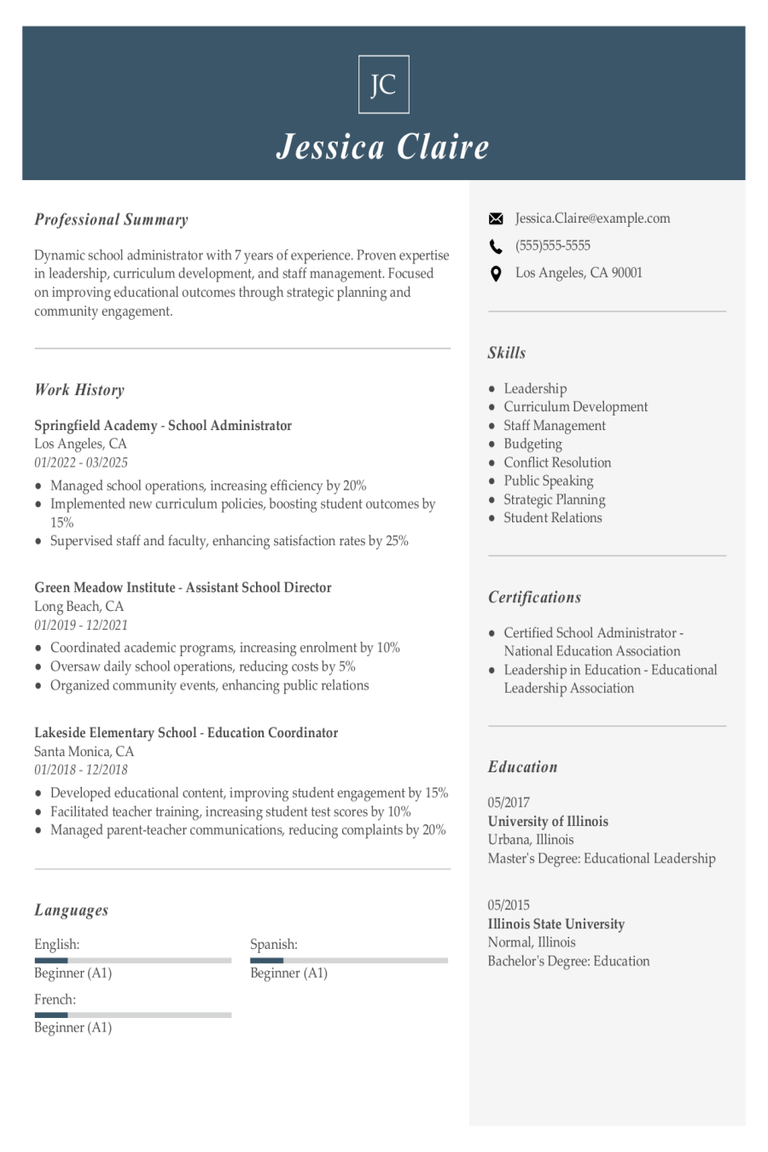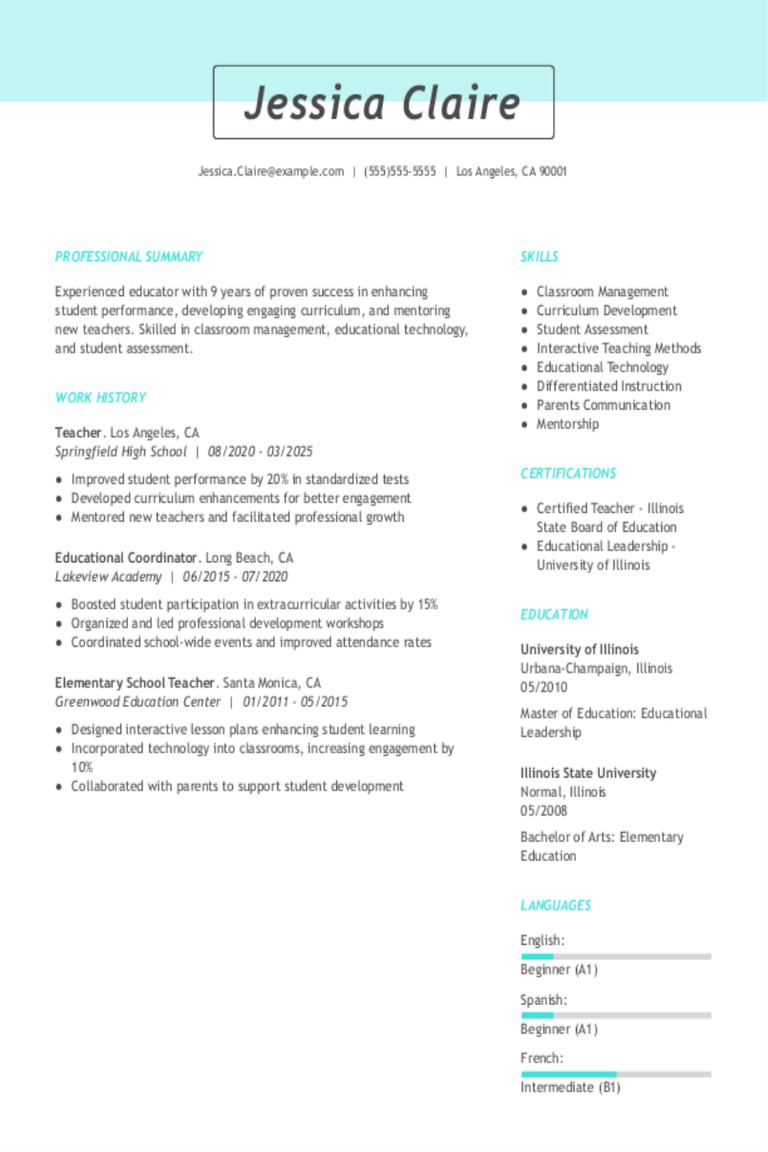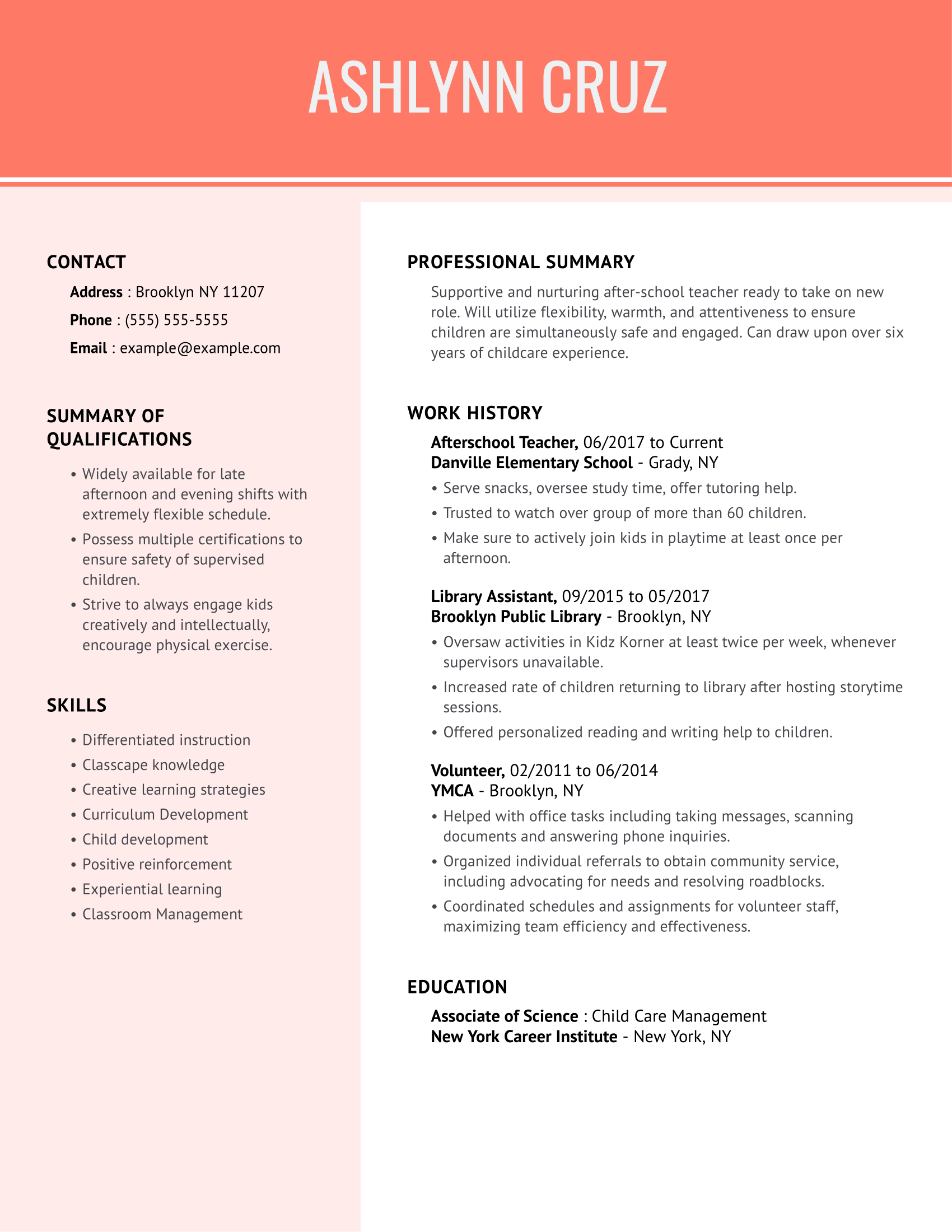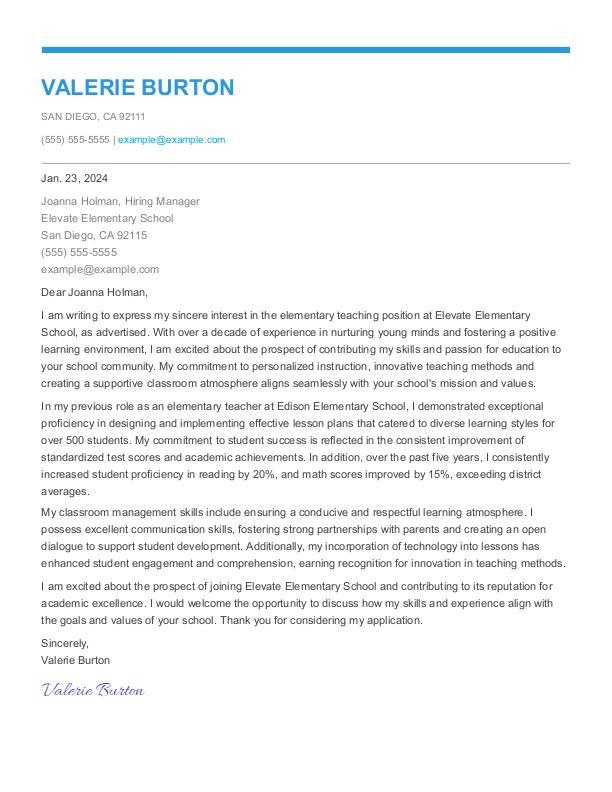Why this resume works
- Quantifies accomplishments: The resume showcases measurable achievements, such as a 15% increase in test scores and a 20% boost in participation, effectively demonstrating the job seeker’s impactful contributions.
- Showcases career progression: Illustrates career progression through advancing job titles and growing responsibilities from junior grade teacher to elementary teacher over several years.
- Illustrates problem-solving ability: The job seeker implemented innovative technology solutions and tailored lessons, showing adept problem-solving skills that led to 100% student engagement and significant improvements in test scores.
More Elementary Teacher Resume Examples
Browse more elementary teacher resume examples to learn how to highlight your teaching skills, classroom management abilities, and passion for education. These teaching resume samples will help you create a resume that stands out effectively.
Entry-Level Elementary Teacher
Why this resume works
- Touches on awards and recognition: The resume prominently showcases awards and recognitions, such as teacher of the year, validating the job seeker’s exceptional performance and contributions in their educational role.
- Puts skills at the forefront: Teaching skills are presented clearly and prominently, making it easy to see the job seeker’s expertise in lesson planning, classroom management, and curriculum development right from the start.
- Effective use of keywords: Role-relevant keywords like “lesson plans,” “student assessment,” and “creative teaching” are strategically included to help the resume pass through applicant tracking systems successfully.
Mid-Level Elementary Teacher
Why this resume works
- Demonstrates language abilities: Underscores language skills through proficiency in English, Spanish, and French, highlighting international project potential and cross-cultural communication skills.
- Includes a mix of soft and hard skills: A blend of soft and hard skills is evident, balancing curriculum development with effective classroom management and strong parent communication.
- Displays technical expertise: The resume showcases technical expertise in educational technology and specialized certifications like CPR, showcasing the job seeker’s ability to handle diverse classroom situations.
Experienced Elementary Teacher
Why this resume works
- Lists relevant certifications: The resume details certifications such as certified elementary teacher and ESL teaching certificate, reflecting a commitment to professional development and expertise in education.
- Showcases impressive accomplishments: Significant accomplishments like boosting test scores by 15% and increasing reading levels by 25% illustrate the candidate’s impactful contributions to student success over their career.
- Focuses on work history: The chronological resume format emphasizes career progression and extensive experience, effectively showcasing senior-level roles in the education field.
Elementary Teacher Resume Template (Text Version)
Jane Jones
Newark, NJ 07102
(555)555-5555
Jane.Jones@example.com
Professional Summary
Dedicated Elementary Teacher with 9 years of experience enhancing student success. Proven track record in increasing test scores by 15% and engagement by 25%. Skilled in curriculum development, classroom management, and technology integration.
Work History
Elementary Teacher
Springfield Elementary – Newark, NJ
March 2021 – March 2025
- Increased test scores by 15% with tailored lessons
- Implemented technology, engaging 100% of students
- Organized school events, boosting participation by 20%
Primary School Instructor
Greenfield Academy – Jersey City, NJ
January 2016 – February 2021
- Enhanced student engagement by 25% with active plans
- Developed curriculum, improving retention by 30%
- Led parent-teacher meetings, attaining 90% approval
Junior Grade Teacher
Bright Future School – Newark, NJ
January 2012 – December 2015
- Boosted reading levels by 20% through targeted lessons
- Created interactive projects, increasing class participation
- Mentored new teachers, reducing turnover by 10%
Languages
- English – Beginner (A1)
- Spanish – Beginner (A1)
- French – Intermediate (B1)
Skills
- Classroom Management
- Curriculum Development
- Creative Lesson Planning
- Student Assessment
- Educational Technology
- Student Engagement
- Parent-Teacher Communication
- Differentiated Instruction
Certifications
- Certified Elementary Teacher – National Board for Professional Teaching Standards
- ESL Teaching Certification – Teachers of English to Speakers of Other Languages
Education
Master of Education Elementary Education
University of Illinois Urbana-Champaign, Illinois
May 2011
Bachelor of Arts Education
Illinois State University Normal, Illinois
May 2009
Popular Skills for a Elementary Teacher Resume
A well-crafted resume skills section is crucial for demonstrating the technical abilities and personal qualities essential for an elementary teacher.
Below are a few of the top soft skills frequently listed on elementary teacher resumes.
| Soft Skills | % of resumes with this skill |
|---|---|
| Team collaboration | 88.00% |
| Differentiated instruction | 84.00% |
| Relationship building | 79.17% |
| Problem-solving | 47.37% |
| Classroom management | 33.33% |
Here are a few examples of hard skills frequently included on elementary teacher resumes.
| Hard Skills | % of resumes with this skill |
|---|---|
| Lesson planning | 80.00% |
| Technology integration | 36.36% |
| Student needs assessment | 18.75% |
| Activity planning | 17.65% |
| Individualized instruction | 15.79% |
Related Resume Guides
Advice for Writing Your Elementary Teacher Resume
Explore tips on how to write a resume that highlights your educational background, teaching experience, and unique classroom skills. Discover how to effectively showcase your passion for education and dedication to fostering a love of learning in children.
Highlight relevant certifications and training
Certifications and specialized training play a crucial role for elementary teachers by showcasing their qualifications in educating young students.
These credentials give employers confidence in your ability to deliver high-quality education and underscore your dedication to professional growth, enhancing your competitiveness as a candidate.
When creating a certifications section, position it after your education section or skills section for optimal visibility. Include relevant certifications and licenses, for example:
- State Teaching License (K-12)
- National Board Certification (NBPTS)
- TESOL/TEFL Certification
- Child Development Associate (CDA) Credential
- Google Certified Educator
- Special Education Certification
- Reading Specialist Certification
- STEM Teaching Certification
- Educational Leadership Certification
Ensure you list the certification name, issuing organization, and date obtained. Emphasize any certifications that align closely with the specific requirements of the school or district where you’re applying. By clearly organizing this section, you can effectively highlight your qualifications as an elementary teacher and stand out in a competitive job market.
Example of a certifications & training section
Elementary Education Teaching Certification
Issued by: State Board of Education
Expires 2026
Reading Specialist Certification
Issued by: International Literacy Association (ILA)
Issued 2023
TESOL (Teaching English to Speakers of Other Languages)
Issued by: TESOL International Association
Completed 2021
CPR and First Aid Certification
Issued by: American Red Cross
Expires 2024
Classroom Management Training Program
Issued by: National Education Association (NEA)
Completed 2022
For additional inspiration, browse our professional resume examples to see what employers like and get ideas for your resume.
List your most relevant skills
As an elementary teacher, it’s important to showcase both technical and soft skills. Technical skills might include proficiency in educational software, classroom technology, and curriculum planning tools.
Soft skills are equally critical and could include communication, patience, creativity, and problem-solving abilities. A well-rounded skill set will help you manage your classroom effectively and cater to each student’s learning needs.
Create a dedicated skills section on your resume highlighting your technical proficiencies, such as Microsoft Office Suite, Google Classroom, or interactive whiteboard software.
Incorporate these skills into your work experience bullet points for greater impact. For example, “Used Google Classroom to streamline assignments” or “Incorporated art projects to boost creativity.”
This approach not only highlights your skills but also demonstrates how you’ve applied them in real-world teaching scenarios.
Identify keywords in the job listing and include them in your resume to beat ATS and impress recruiters.
Write a strong professional summary
A professional summary is a concise section at the top of your resume highlighting your relevant skills and accomplishments. For an elementary teacher, it is essential to emphasize your expertise in designing engaging lesson plans, maintaining a positive classroom atmosphere, and guiding students to academic success.
If you lack extensive experience as an elementary teacher, opt for a resume objective instead to outline your career aspirations and how they match the job you’re seeking. Use dynamic language to highlight your passion for teaching, relevant abilities, and dedication to education. For instance: “Eager to inspire young minds through creative teaching methods.”
Whether using a professional summary or resume objective, underscore your unique strengths and any significant achievements like improved student test scores or successful projects. Arrange this section clearly to immediately capture the hiring manager’s attention.
Elementary teacher resume summary examples
Entry-level
Enthusiastic and dedicated recent graduate with a bachelor’s degree in elementary education from Temple University. Certified in elementary education (K-6) with hands-on experience gained through student teaching and internships. Proficient in creating engaging lesson plans, utilizing educational technology, and fostering a positive learning environment. Passionate about inspiring young minds and committed to the academic and social success of students.
Mid-career
Motivated elementary teacher with over 5 years of experience in diverse classroom settings. Skilled in curriculum development, differentiated instruction, and classroom management. Proven track record of enhancing student performance through innovative teaching methods and personalized learning strategies. Holds a master’s degree in education and is certified in special education (K-12). Recognized for strong communication skills, collaboration with parents, and commitment to professional development.
Experienced
Seasoned elementary educator with 15+ years of experience leading successful classrooms and advancing educational programs. Expertise in literacy interventions, STEM education, and integrating technology into the curriculum. Holds national board certification and a master’s degree in educational leadership. Demonstrated ability to mentor new teachers, implement school-wide initiatives, and achieve measurable improvements in student outcomes. Dedicated to fostering an inclusive learning environment that supports the growth of every child.
Elementary teacher resume objective examples
Recent graduate
Enthusiastic recent education graduate with a bachelor’s degree in elementary education seeking to start a career as an elementary teacher. Dedicated to creating an engaging and supportive classroom environment that fosters student growth and learning. Eager to apply strong communication skills, creativity, and passion for teaching in a dynamic school setting.
Career changer
Motivated professional with experience in child development transitioning into elementary education. Equipped with strong organizational skills, patience, and a genuine interest in fostering educational growth. Aiming to leverage previous experience in managing children’s programs to become an effective and inspiring elementary teacher.
Specialized training
Recent graduate with specialized training in early childhood literacy and inclusive education seeking an elementary teaching position. Committed to promoting literacy, diversity, and inclusion within the classroom while providing individualized support to students. Passionate about utilizing innovative teaching methods to enhance student engagement and academic success.
Use our Resume Builder to easily create an elementary teacher resume that stands out to hiring managers.
Showcase your accomplishments and publications
Including publications, conference presentations, and research accomplishments on your resume highlights your commitment to professional growth and expertise in education.
These achievements show that you are actively involved in the educational community and dedicated to improving teaching practices through research.
To create a publications section, list peer-reviewed articles, book chapters, and conference papers in an organized format. Use citation details such as the journal name, volume, issue, and year following a professional style guide like APA or MLA. For example: “Smith, J. (2021). Innovative Teaching Strategies. Journal of Education Research, 34(2), 123-135.”
Highlight any major awards, grants, or fellowships related to your research for added credibility. If applicable, include links to online research profiles like Google Scholar or ResearchGate so employers can easily access your work.
This structured approach will help potential employers appreciate the depth of your knowledge and dedication to education while making it simple for them to verify your contributions.
Example of a publications section
Peer-Reviewed Journal Articles
- Johnson, L., & Martinez, R. (2023). Innovative teaching strategies in elementary education. Journal of Educational Research, 58(1), 45-60.
- Taylor, A., & Johnson, L. (2021). The role of technology in modern classrooms: An elementary perspective. Education Technology Review, 34(2), 78-92.
Books and Book Chapters
- Johnson, L. (2020). Engaging Young Minds: A Guide to Effective Elementary Teaching. New York: Education Press.
- Smith, K., & Johnson, L. (2019). Chapter 4: Collaborative Learning Techniques for Young Students. In R. Brown (Ed.), Innovative Practices in Education (pp. 56-75). London: Academic Publishing.
Conference Papers
- Johnson, L., & Lee, M. (2022). Integrating Arts into STEM Curriculum for Elementary Students. Paper presented at the International Conference on Education Innovation, San Francisco, CA.
- Garcia, S., & Johnson, L. (2021). Addressing Diverse Learning Needs in the Elementary Classroom through Differentiated Instruction. Paper presented at the National Association for Elementary School Principals Conference, Chicago, IL.
Select a resume template that is clean and straightforward, ensuring it features clear sections with legible fonts while steering clear of excessive colors or elaborate designs.
FAQ
Do I need to include a cover letter with my elementary teacher resume?
Including a cover letter with your elementary teacher resume can significantly enhance your application. It allows you to express your enthusiasm for the teaching profession, highlight specific skills and experiences that align with the position, and articulate your interest in working at a particular school or district.
A well-crafted elementary teacher cover letter allows you to share meaningful insights into your teaching philosophy, classroom management strategies, and notable successes with students. This personalized approach helps hiring managers gain a deeper understanding of your qualifications and what sets you apart as a candidate.
A cover letter shows your professionalism and attention to detail — essential qualities for an elementary teacher. For help crafting yours, explore our cover letter examples and use our Cover Letter Generator for personalized content suggestions.
How long should a elementary teacher’s resume be?
A one-page resume is ideal for elementary teachers, ensuring a clear and concise presentation of qualifications, teaching experience, and key accomplishments for easy review by principals or hiring committees.
Emphasize your classroom management skills, lesson planning abilities, and unique contributions to student development or school activities.
A two-page resume is acceptable for those with extensive experience or additional certifications, but every detail should add value and be relevant to the position you’re applying for.
How do you write a elementary teacher resume with no experience?
When creating your resume with no experience for an elementary teacher position, emphasize your education, relevant coursework, and any hands-on training or volunteer work that showcases your teaching abilities.
Start by listing your degree in education, the institution’s name, graduation date, and any honors or notable achievements. Be sure to include your teaching certification if you have one.
Detail your student teaching experiences by mentioning the grade levels and subjects you taught. Highlight responsibilities such as lesson planning, classroom management, and assessments.
Using bullet points, clearly present relevant skills like communication, creative lesson planning, patience, adaptability, and other important qualities for an elementary teacher.
Include any volunteer work or roles involving children outside a formal classroom setting (such as tutoring, summer camps, or after-school programs), detailing these experiences and accomplishments.
Rate this article
Elementary Teacher
Additional Resources

School Administrator Resume Examples & Templates
Explore school administrator resume examples to learn how to highlight your leadership skills and experience with staff supervision and school operations.Build my resumeImport existing resumeCustomize this templateZoomWhy this resume worksQuantifies

Teacher Resume Examples & Templates
Explore a variety of teacher resume examples that demonstrate how to organize your resume, highlight essential teaching skills, and showcase your classroom experience.Build my resumeImport existing resumeCustomize this templateZoomWhy this

Provider Resume: Example & Tips
In addition to supervising and monitoring the safety of children under their care, childcare providers are tasked with preparing meals and snacks for children, and developing schedules that ensure children

After School Teacher Resume: Examples & Tips
After school teachers are required to be in charge of children in after-school programs, ensuring a positive learning environment by organizing activities, assisting children with assignments and preparing study materials.Those

How to List Projects on a Resume
Your career goes beyond your role duties. What you’ve accomplished outside the expectations of your role can speak highly of your professional impact. Including projects on a resume shows an

Elementary Teacher Cover Letter Examples & Templates
An elementary teacher’s work is both challenging and rewarding. They teach various subjects — including math, science and reading — to young students from kindergarten to fifth grade. They play
